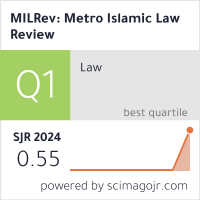Digital Rights and Women's Empowerment in Pakistan: An Analysis of Contemporary Islamic Legal Perspectives in the Age of Social Media
DOI:
https://doi.org/10.32332/milrev.v3i1.8642Keywords:
Digital Rights, Women's Empowerment, Contemporary Islamic Law, Social MediaAbstract
The examination of the convergence between digital rights and women's empowerment is conducted within the socio-legal framework in Pakistan, with particular emphasis on the influence of contemporary Islamic legal perspectives amidst increased social media engagement. Therefore, this study aimed to examine the evolving dynamics of women's participation in the digital space and the attendant impact on empowerment in Pakistan. The analysis discussed the origins and expansion of digital landscape and the influence of social media on people's lives. The qualitative study focused on Islamic teachings and the implications for rules in the digital world. In addition, data was collected through interviews with several women of different ages and backgrounds. Social media and digital platforms offered access to information, education, and opportunities for skills development. The results showed that women used digital platforms for entrepreneurship and economic empowerment. This supported economic independence and ethical business practices, in line with Islamic principles to seize opportunities. In the face of challenges and opportunities, the ethical dimensions were considered from an Islamic perspective. Emphasizing values such as justice, privacy, dignity, and the pursuit of knowledge could guide efforts to promote digital rights for women's empowerment in line with Islamic principles.










